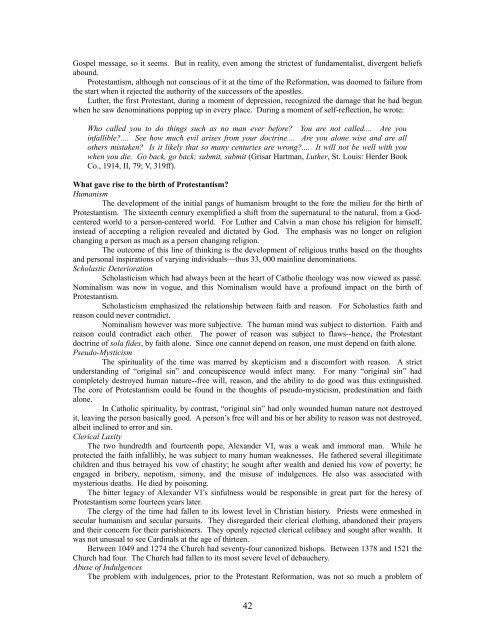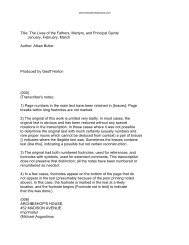Ecce Fides - Pillar of Truth - St. Patrick's Basilica
Ecce Fides - Pillar of Truth - St. Patrick's Basilica
Ecce Fides - Pillar of Truth - St. Patrick's Basilica
You also want an ePaper? Increase the reach of your titles
YUMPU automatically turns print PDFs into web optimized ePapers that Google loves.
Gospel message, so it seems. But in reality, even among the strictest <strong>of</strong> fundamentalist, divergent beliefs<br />
abound.<br />
Protestantism, although not conscious <strong>of</strong> it at the time <strong>of</strong> the Reformation, was doomed to failure from<br />
the start when it rejected the authority <strong>of</strong> the successors <strong>of</strong> the apostles.<br />
Luther, the first Protestant, during a moment <strong>of</strong> depression, recognized the damage that he had begun<br />
when he saw denominations popping up in every place. During a moment <strong>of</strong> self-reflection, he wrote:<br />
Who called you to do things such as no man ever before? You are not called.... Are you<br />
infallible?.... See how much evil arises from your doctrine.... Are you alone wise and are all<br />
others mistaken? Is it likely that so many centuries are wrong?.... It will not be well with you<br />
when you die. Go back, go back; submit, submit (Grisar Hartman, Luther, <strong>St</strong>. Louis: Herder Book<br />
Co., 1914, II, 79; V, 319ff).<br />
What gave rise to the birth <strong>of</strong> Protestantism?<br />
Humanism<br />
The development <strong>of</strong> the initial pangs <strong>of</strong> humanism brought to the fore the milieu for the birth <strong>of</strong><br />
Protestantism. The sixteenth century exemplified a shift from the supernatural to the natural, from a Godcentered<br />
world to a person-centered world. For Luther and Calvin a man chose his religion for himself,<br />
instead <strong>of</strong> accepting a religion revealed and dictated by God. The emphasis was no longer on religion<br />
changing a person as much as a person changing religion.<br />
The outcome <strong>of</strong> this line <strong>of</strong> thinking is the development <strong>of</strong> religious truths based on the thoughts<br />
and personal inspirations <strong>of</strong> varying individuals—thus 33, 000 mainline denominations.<br />
Scholastic Deterioration<br />
Scholasticism which had always been at the heart <strong>of</strong> Catholic theology was now viewed as passé.<br />
Nominalism was now in vogue, and this Nominalism would have a pr<strong>of</strong>ound impact on the birth <strong>of</strong><br />
Protestantism.<br />
Scholasticism emphasized the relationship between faith and reason. For Scholastics faith and<br />
reason could never contradict.<br />
Nominalism however was more subjective. The human mind was subject to distortion. Faith and<br />
reason could contradict each other. The power <strong>of</strong> reason was subject to flaws--hence, the Protestant<br />
doctrine <strong>of</strong> sola fides, by faith alone. Since one cannot depend on reason, one must depend on faith alone.<br />
Pseudo-Mysticism<br />
The spirituality <strong>of</strong> the time was marred by skepticism and a discomfort with reason. A strict<br />
understanding <strong>of</strong> “original sin” and concupiscence would infect many. For many “original sin” had<br />
completely destroyed human nature--free will, reason, and the ability to do good was thus extinguished.<br />
The core <strong>of</strong> Protestantism could be found in the thoughts <strong>of</strong> pseudo-mysticism, predestination and faith<br />
alone.<br />
In Catholic spirituality, by contrast, “original sin” had only wounded human nature not destroyed<br />
it, leaving the person basically good. A person’s free will and his or her ability to reason was not destroyed,<br />
albeit inclined to error and sin.<br />
Clerical Laxity<br />
The two hundredth and fourteenth pope, Alexander VI, was a weak and immoral man. While he<br />
protected the faith infallibly, he was subject to many human weaknesses. He fathered several illegitimate<br />
children and thus betrayed his vow <strong>of</strong> chastity; he sought after wealth and denied his vow <strong>of</strong> poverty; he<br />
engaged in bribery, nepotism, simony, and the misuse <strong>of</strong> indulgences. He also was associated with<br />
mysterious deaths. He died by poisoning.<br />
The bitter legacy <strong>of</strong> Alexander VI’s sinfulness would be responsible in great part for the heresy <strong>of</strong><br />
Protestantism some fourteen years later.<br />
The clergy <strong>of</strong> the time had fallen to its lowest level in Christian history. Priests were enmeshed in<br />
secular humanism and secular pursuits. They disregarded their clerical clothing, abandoned their prayers<br />
and their concern for their parishioners. They openly rejected clerical celibacy and sought after wealth. It<br />
was not unusual to see Cardinals at the age <strong>of</strong> thirteen.<br />
Between 1049 and 1274 the Church had seventy-four canonized bishops. Between 1378 and 1521 the<br />
Church had four. The Church had fallen to its most severe level <strong>of</strong> debauchery.<br />
Abuse <strong>of</strong> Indulgences<br />
The problem with indulgences, prior to the Protestant Reformation, was not so much a problem <strong>of</strong><br />
42






